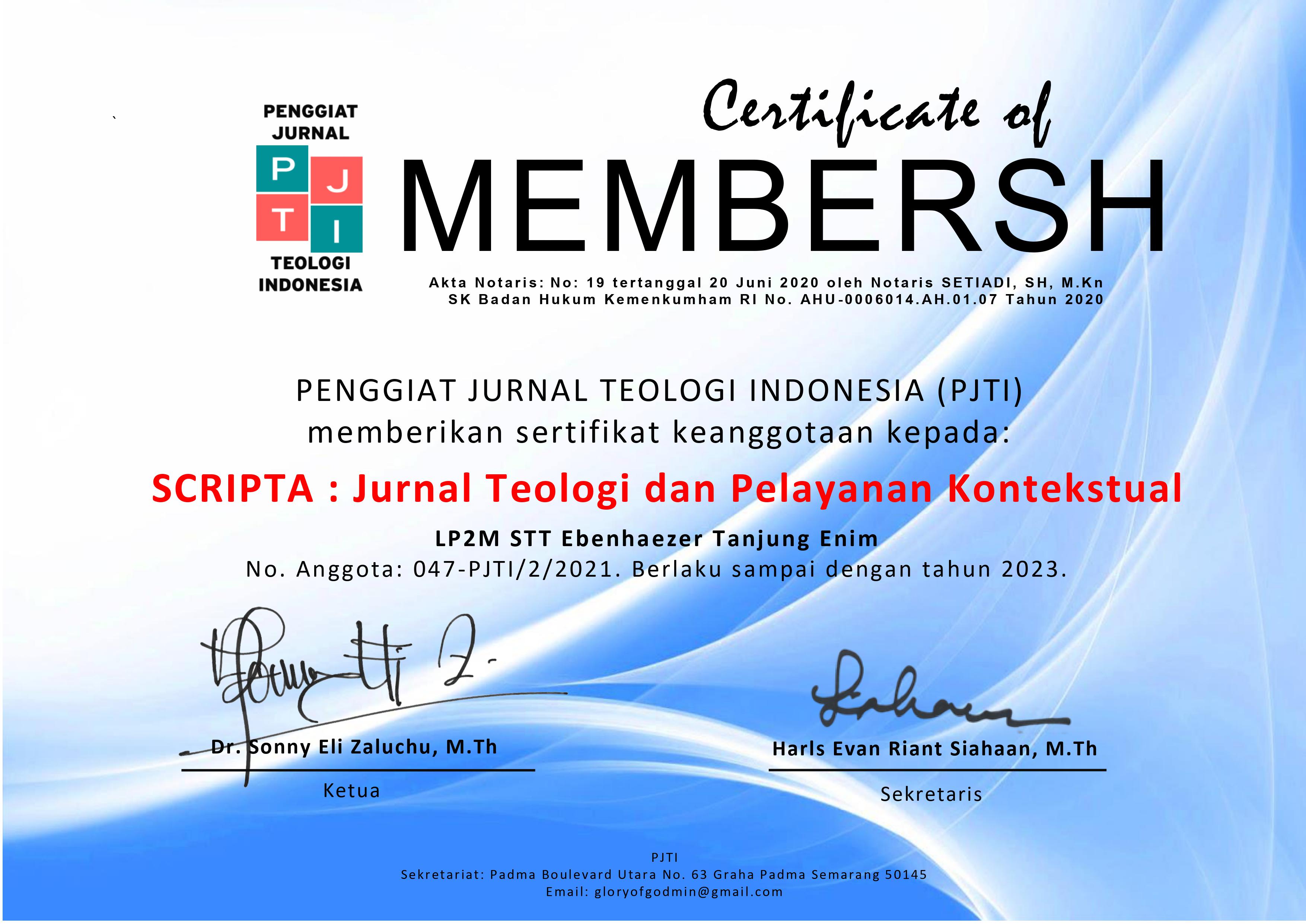Studi Eksegesis Amsal 1-9: Suatu Antitesis Antara Orang Bebal dan Orang Bijak
DOI:
https://doi.org/10.47154/sjtpk.v15i1.194Keywords:
The Fear of the Lord, Proverbs 1-9, AntithesisAbstract
The purpose of this research is to understand the meaning of fear of God in the text of Proverbs 1-9. Because the phrase "fear of God" often shows a gap in interpretation as an action-consequence relationship and re-interpretation in the orientation of obedience to wise qualities. This study uses a qualitative approach using the hermeneutic method of the wisdom genre, in particular paying attention coherently to the thematic phrase "fear of the Lord" in Proverbs 1-9. Thematic analysis of the relation of wisdom literature pays attention to translational or literal analysis, context, theological and especially the structure of antithetical parallelism, as well as the character-consequence pattern of the fool and the wise man. The result of this study is that the phrase "fear of God" describes a rebuke and rejection of wisdom which has bad consequences for a person. However, the peculiarity of wisdom in the phrase "fear of the Lord" provides a coherent orientation between knowledge and knowledge of God. It can be concluded that the basis of wisdom, namely "fearing the Lord" provides an understanding for wise and stupid people. The uniqueness of this interpretation is caused by the peculiarity of the pattern of words that are retribution (cause and effect) in the book of Proverbs 1-9. Not surprisingly, the meaning of the phrase "fear of God" emphasizes character/habits and the impact of true wisdom.
References
A.Adenugba, D. “Effects of Dreams on Human Stress and a Novel Server for Physics Stress.” International Journal of Applied Information Systems 6, no. 1 (2013).
Adamo, David T. “The Concept of Monotheism in the Book of Proverbs and an African (Yoruba) Perspective.” Verbum et Ecclesia 43, no. 1 (2022).
Balentine, Sameul E. “Proverbs.” In The Oxford Handbook of Wisdom and the Bible, edited by Will Kynes, 495. New York: Oxford University Press, 2021.
Baris, Michael. “Iniquities Ensnare the Wicked: The Ethical Theory of Proverbs 1-9.” Hebrew Studies 56, no. 3 (2015): 129–144.
Bridges, Charles. The Crossway Clasic Commantaries-Proverbs. Nottingham: Crossway Books, 2001.
Brown, William P. “Virtue and Its Limits in the Wisdom Corpus: Character Formation, Disruption and Transformation.” In The Oxford Handbook of Wisdom and the Bible, edited by Will Kynes, 48. New York: Oxford University Press, 2021.
Cezula, Ntozakhe Simon. “The ‘Fear of the Lord/God’ in Context of the South Africa We Pray for Campaign.” Scriptura 116, no. 2 (2017).
Corley, Jeremy. “Wisdom and Fear of God in Ben Sira 1:11–21: Second Temple Perspectives.” Journal for the Study of the Pseudepigrapha 30, no. 1 (2020): 53.
Evans, C. Stephen. “Accountability and the Fear of the Lord.” Studies in Christian Ethics 34, no. 3 (2021).
Fiddes, Paul S. “Wisdom in Christian Theology.” In The Oxford Handbook of Wisdom and the Bible, edited by Will Kynes, 257. New York: Oxford University Press, 2021.
Fox, Michael V. “Ethics and Wisdom in the Book of Proverbs.” Hebrew Studies 48, no. 1 (2007).
Holladay, William L. A Concise Hebrew and Aramaic Lexicon of the Old Testament. Edited by E. J Brill. Michigan: Eerdmans Publishing, 2000.
Holladay, William Lee, Ludwig Köhler, and Walter Baumgartner. A Concise Hebrew and Aramaic Lexicon of the Old Testament: Based upon the Lexical Work of Ludwig Koehler and Walter Baumgartner. Grand Rapids: Wm. B. Eerdmans Publishing, 2000.
Horne, Milton P. Smyth & Helwys Commentary, Proverbs-Ecclesiastes. Macon: Smyth&Helweys, 2003.
Keefer, Arthur. “A Shift in Perspective: The Intended Audience and a Coherent Reading of Proverbs 1:1-7.” Journal of Biblical Literature 136, no. 1 (2017): 104.
———. “Revising the Modern Moral Paradigm with the Book of Proverbs.” Religions 7, no. 6 (2016).
Keefer, Arthur J. “The Use of the Book of Proverbs in Systematic Theology.” Biblical Theology Bulletin 46, no. 1 (2016).
Keil, C F, and F Delitzsch. Biblical Commentary on The Old Testament. Grand Rapids: Eerdmans Publishing, 1950.
———. Commentary on the Old Testament. Grand Rapids: Titus Books, 2014.
Kusradi, Sri Wahyuni, Marlon Butarbutar, and Jeane Paath. “‘Dekapan Kesakitan Tuhan’ Dalam Kitab Para Nabi Sebagai Model Fatherhood Leadership.” PASCA: Jurnal Teologi dan Pendidikan Agama Kristen 17, no. 2 (2021).
Van Leeuwen, Raymond C. “Theology: Creation, Wisdom, and Covenant.” In The Oxford Handbook of Wisdom and the Bible, edited by Will Kynes, 71. New York: Oxford University Press, 2021.
Longman III, Tremper. “Theology of Wisdom.” In The Oxford Handbook of Wisdom and the Bible, edited by Will Kynes, 391. New York: Oxford University Press, 2021.
Millar, Suzanna R. “The Path Metaphor and the Construction of a Schicksalwirkende Tatsphäre in Proverbs 10:1-22:16.” Vetus Testamentum 69, no. 1 (2019).
Moser, Paul K. “The Fear of the Lord: The Beginning of Reconciliation.” Irish Theological Quarterly 87, no. 2 (2022).
Nelly, Nelly, and Rodi Imenuel Nome. “Makna Takut Akan Tuhan Menurut Amsal 8:13 (Studi Evaluasi Di Jemaat GPdI ‘Filadelfia’ Oepaleo Kupang).” KAMASEAN: Jurnal Teologi Kristen 1, no. 2 (2020).
Osborne, Grant R. Spiral Hermeneutika: Pengantar Komperehensif Bagi Penafsiran Alkitab. Surabaya: Momentum, 2012.
Paath, Jeane, and Wince Berlian Febritha Ziliwu. “Disiplin Rohani Bagi Mahasiswa STT Ebenhazer: Prespektif Dalam Perjanjian Lama.” Manna Rafflesia 9, no. Pelayanan Penyebaran Injil Berdasarkan 2 Korintus 6:1-10 (2023).
Prianto, Robi, Hesron Yuswanto, and Yohanes Hasiholan Tampubolon. “Pertumbuhan Spiritualitas Remaja Kristen: Studi Eksegesis Amsal 1:1-7.” Te Deum: Jurnal Teologi dan Pengembangan Pelayanan 12, no. Desember (2022).
Sandy, D. Brent, and Ronald L. Giese Jr. Cracking Old Testament Codes: A Guide Interpreting the Literary Genres of the Old Testament. Nashville: Broadman & Holman Publishers, 1995.
Saur, Markus. “The Chronological Development of Wisdom Literature.” In The Oxford Handbook of Wisdom and the Bible, edited by Will Kynes, 377. New York: Oxford University Press, 2021.
Schwáb, Zoltán. “Is Fear of the Lord the Source of Wisdom or Vice Versa?” Vetus Testamentum 63, no. 4 (2013).
Sinulingga, Risnawaty. Amsal Pasal 1-9 (Seri Tafsiran Alkitab). Jakarta: BPK Gunung Mulia, 2016.
———. Tafsiran Alkitab: Amsal 10:1-22:16. Jakarta: BPK Gunung Mulia, 2012.
Sualang, Farel Yosua. Pembentukan Karakter Melalui Teks-Teks Harta Dalam Amsal 10:1-22:16. Ponorogo: Gracias Logis Kreatif, 2021.
———. “Prinsip-Prinsip Hermeneutika Genre Hikmat Dalam Kitab Amsal: Suatu Pedoman Eksegesis.” Jurnal PISTIS 1, no. Old Testament, Genre of Wisdom, Hermeneutics (2019).
Sualang, Farel Yosua, and Eden Edelyn Easter. “Faktor-Faktor Pembentukan Karakter Berdasarkan Amsal 13:22 Tentang Warisan Harta Dan Ajaran Moral.” Integritas: Jurnal Teologi 2, no. 2 (2020).
———. “Integrasi Integritas Dan Lingkungan Sosial Untuk Membentuk Reputasi: Analisis Sastra Hikmat Amsal 22:1-2.” HUPERETES:
Published
How to Cite
Issue
Section
Copyright (c) 2023 SCRIPTA : Jurnal Teologi dan Pelayanan Kontekstual

This work is licensed under a Creative Commons Attribution 4.0 International License.

SCRIPTURA: Jurnal Teologi dan Pelayanan Kontekstual is licensed under a Creative Commons Attribution-ShareAlike 4.0 International License.


















